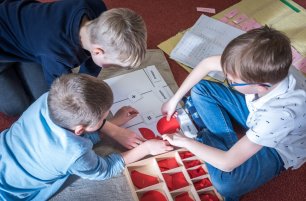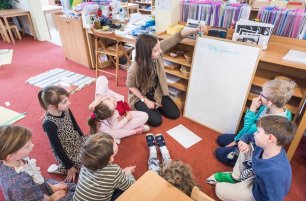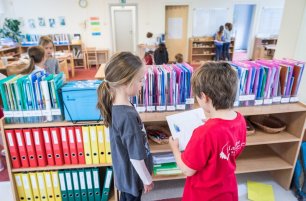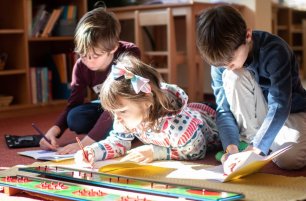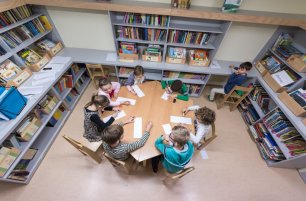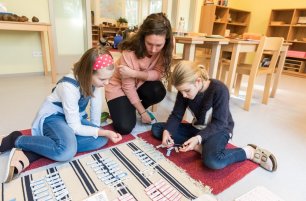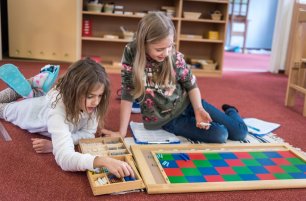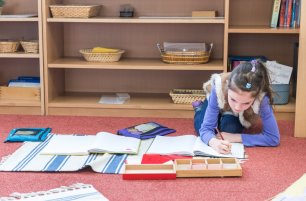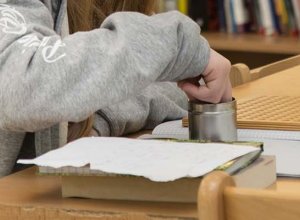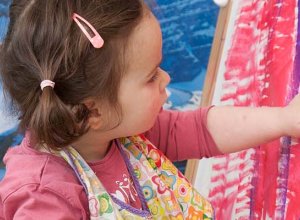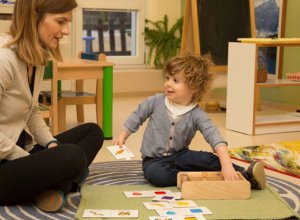Elementary
The Elementary Program at IMSP guides students from a Montessori foundation through an innovative curriculum designed to prepare them for transition to secondary school. The program combines rigorous academics with an approach to learning that instills responsibility, independence, and sense of community.
Our Elementary Program is divided into two levels: Lower Elementary (First through Third Grade), and Upper Elementary (Fourth through Sixth Grade). As students progress through our Elementary Program, they gradually move from concrete to abstract, from fundamental to complex, from distinct to integrated and interrelated. Study materials reflect multiple levels of understanding and students progress at their own pace within the framework of the curriculum. Success - both academic and social - is regularly monitored through a series of benchmarking systems.
Children in the Elementary Czech Program develop all skills in Czech language, communication, stylistics and literature and understand the basic differences among Czech, other European and American cultures in all subjects. Topics are related and addressed in both languages as necessary.
All Elementary students regularly participate in lessons in Visual Arts, Performing Arts, Music and Physical Education. Spanish is available to interested students.
Lower Elementary
The Lower Elementary curriculum focuses on strengthening skills in all academic areas. Work activities designed to develop critical thinking are introduced. Independence and self-management skills are cultivated through the use of daily and weekly planners. Communication skills and sense of community are cultivated through the culture curriculum, designed to instill in students a broader view of the world and a growing understanding of their place in it.
The Montessori curriculum is taught from large scope to small, moving from big-picture understanding to a focus on details. The children continue to work with concrete materials to explore academic areas, quickly discovering abstract methods to utilize.

Our academic curriculum aligns with the standards and frameworks set by the Czech Ministry of Education — and goes above and beyond by integrating Montessori methods and experiential learning thoughout. This allows our Czech students to transfer smoothly into their secondary schools, without requiring special admittance procedures or entrance exams.
A primary goal of the Lower Elementary Program is to prepare students for successful learning at the Upper Elementary level. To that end, supplemental non-Montessori activities are introduced at a growing rate around Third Grade along with opportunities for leadership and mentorship.
Who is the 6 to 9 year old?
From first grade through third grade, children are excited and ready to learn. Having reached a stage of physical stability, they enter into the age of reasoning and logic. Their imaginations are strong and are able to learn and think about things that they cannot see or touch. The Lower Elementary child is interested in exploring not only their immediate surroundings, but in knowing and understanding the bigger world.
 Where the younger child is gaining physical independence, the elementary child is working on intellectual independence. The Lower Elementary child is also becoming very social, being with friends and working out issues of friendship and the appropriate behavior for groups becomes very important.
Where the younger child is gaining physical independence, the elementary child is working on intellectual independence. The Lower Elementary child is also becoming very social, being with friends and working out issues of friendship and the appropriate behavior for groups becomes very important.
Dr. Montessori referred to the elementary stage as the Intellectual Period. Given an open and rich environment, there are no limits to what the child may learn and explore! Dr. Montessori saw this time as a critical time for expansive education, giving the children lessons and questions to guide their explorations of culture, science, mathematics, language and social rules and morals.
To this end, the IMSP Lower Elementary classroom is an exciting and busy place. The passion for learning is palpable, as the children delve into the many lessons available to them. They work both in groups and individually, learning to manage group dynamics, while they also master academic skills.
IMSP’s Upper Elementary
Program is designed to prepare students for successful transition into top secondary schools. A rigorous academic curriculum, integrating the Montessori philosophy with carefully selected educational best practices, guides students to that end.
 The Upper Elementary curriculum is a dynamic continuation of the work and studies from the previous levels. This next level of education guides the students as they move away from more concrete, fact-based learning, into an age of abstraction and reason. Fueled by exceptional strong imaginations and a desire to understand how things work, the Upper Elementary Students are well prepared for a curriculum that challenges them with advanced ideas in literature, history, science, mathematics, and language.
The Upper Elementary curriculum is a dynamic continuation of the work and studies from the previous levels. This next level of education guides the students as they move away from more concrete, fact-based learning, into an age of abstraction and reason. Fueled by exceptional strong imaginations and a desire to understand how things work, the Upper Elementary Students are well prepared for a curriculum that challenges them with advanced ideas in literature, history, science, mathematics, and language.
As the students continue through what Dr. Montessori called the Intellectual Period, they develop intellectually, socially and morally, as active participants in their classroom communities and their own learning. Hands-on learning, coupled with more abstract work, discussions, and experiential education, create a balance of learning experiences for the active minds and bodies of the Upper Elementary student. Group work is highlighted throughout the curriculum, to create a productive and positive outlet for their very social students. Ongoing independent work is also vital, and allows students to challenge themselves, hone organizational skills and build a solid foundation of academic skills.
Students apply and refine their academic and organizational skills in the context of projects. They develop autonomy through the management of long-term projects while improving their planning and collaboration skills. Woven into the academic curriculum is a rich social curriculum that cultivates respectfulness, independence and self-confidence.
Our academic curriculum aligns with the standards and frameworks set by the Czech Ministry of Education — and goes above and beyond by integrating Montessori methods and experiential learning thoughout. This allows our Czech students to transfer smoothly into their secondary schools, without requiring special admittance procedures to enter the public school system.

Who is the 9-12 year old?
During this time period, children continue to operate in the Intellectual Period of the elementary stage and now rapidly move towards abstraction in learning. They are interesting in moving beyond basic facts and begin to look at connections, cause and effect, and patterns in their learning and understanding of the world. At this developmental stage, students show a strong ability for both imagination and abstraction.
The 9- to 12-year-olds are very social at this time in their lives, and it is the first time in their development when they may look more towards their peers than their families when deciding the right way to do certain things. Their strong social instincts lead to most work and play being done in groups.
In 4th, 5th and 6th grade, the child demonstrates a more refined sense of logic and greater ability to think in the abstract. The academic program encourages intellectual independence, rigor, and a love of learning. In response to the need for peer contact, the IMSP Upper Elementary classroom encourages social interaction and group work as part of the each student's academic work. Social and moral development are interwoven into all aspects of the curriculum, in response to the 9- to 12-year-old's interest in fairness, justice, and morality.
